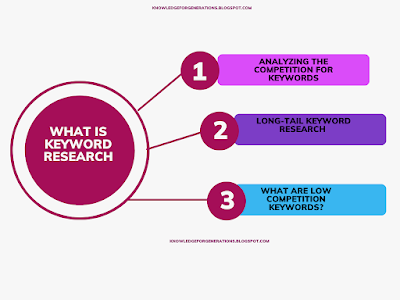What is keyword research ?
Keyword research is the process of identifying and selecting keywords and phrases that people are searching for in relation to your products or services. This information can then be used to optimize your website and content for those keywords, in order to improve your search engine rankings and drive more traffic to your site. There are several tools available for conducting keyword research, such as Google's Keyword Planner, SEMrush, Ahrefs, and Moz's Keyword Explorer. The process generally includes researching and identifying relevant keywords, analyzing the competition for those keywords, and selecting the most relevant and valuable keywords to target. Additionally, Long-tail keyword research is also important as it targets specific niche audience and improves the chances of conversion.
 |
| What is Keyword Research |
Analyzing the competition for keywords
Importance of analyzing competition for keyword?
Analyzing the competition for keywords is an important step in the keyword research process. It helps you understand the level of competition for a particular keyword and how difficult it may be to rank for that keyword. There are several ways you can analyze the competition for keywords:
Check the search results: One way to analyze the competition is to simply search for the keyword in question and take a look at the top-ranking websites. If the top results are primarily big, well-established websites, the competition is likely to be high.
Use keyword research tools: Many keyword research tools, such as Google's Keyword Planner, SEMrush, Ahrefs and Moz's Keyword Explorer, provide information on the competition level for a keyword. These tools typically use metrics such as CPC and search volume to determine the level of competition.
Check the backlinks: Analyzing the backlinks of the top-ranking pages for a keyword can give you an idea of how difficult it will be to outrank them. You can use tools like Ahrefs and Moz to check the backlinks of a page.
When analyzing competition, it's also important to consider the relevance of the top-ranking pages. For example, a page that is well-optimized for a keyword but not relevant to your business will be less of a concern than a page that is both well-optimized and highly relevant.
Keep in mind that keyword research is not a one-time process, and it's important to regularly monitor the competition and adjust your strategy as needed.
Long-tail keyword research
Long-tail keyword research is the process of identifying and targeting longer, more specific keywords and phrases that are less competitive and more likely to convert into sales or leads. These keywords are usually made up of 3 or more words and are more specific than short-tail keywords.
What are low competition keywords?
For example, "shoes" is a short-tail keyword, while "men's running shoes" is a long-tail keyword. Long-tail keywords generally have lower search volumes than short-tail keywords, but they are often more specific and targeted, making them more likely to convert into sales or leads.
Long-tail keywords can be found through the same process of keyword research as short-tail keywords, but with a focus on longer phrases and questions. There are several tools available for conducting long-tail keyword research, such as Google's Keyword Planner, SEMrush, Ahrefs, and Moz's Keyword Explorer. Additionally, you can use tools like Google's autocomplete feature, Google Trends and Answer the Public to find long-tail keywords.
Long-tail keyword research is important because it allows you to target specific niche audience and improves the chances of conversion. It also helps to reduce competition and increase the chances of ranking higher in search engine results.



0 Comments